Demolition Contractors Northampton
Find top Structure Demolition in Northampton
Get 3 FREE Building Demolition quotes for your project today! Compare profiles, reviews, accreditations, portfolio, etc... and choose the best offer.

Staten Island Masonry- Staten Island Masonry Contractors
518 reviewsYork, USStaten Island Masonry Serving Staten Island and surrounding areas Staten Island Masonry and Concrete is the premier choice for masonry and concrete services in Staten Island. Our team of experienced masonry contractors specialize in a variety of services, including brick laying, block laying, and concrete work. We have been providing superior quality masonry and concrete services to Staten Island and the surrounding areas for over 20 years. We are committed to providing outstanding customer service and craftsmanship on every project. Our team is dedicated to providing the highest quality standard of work and strive to exceed our customers’ expectations. We take the time to understand your project and provide a tailored solution that meets your needs.
- Services
- Why Us?
- Testimonials
- Gallery
Get Quote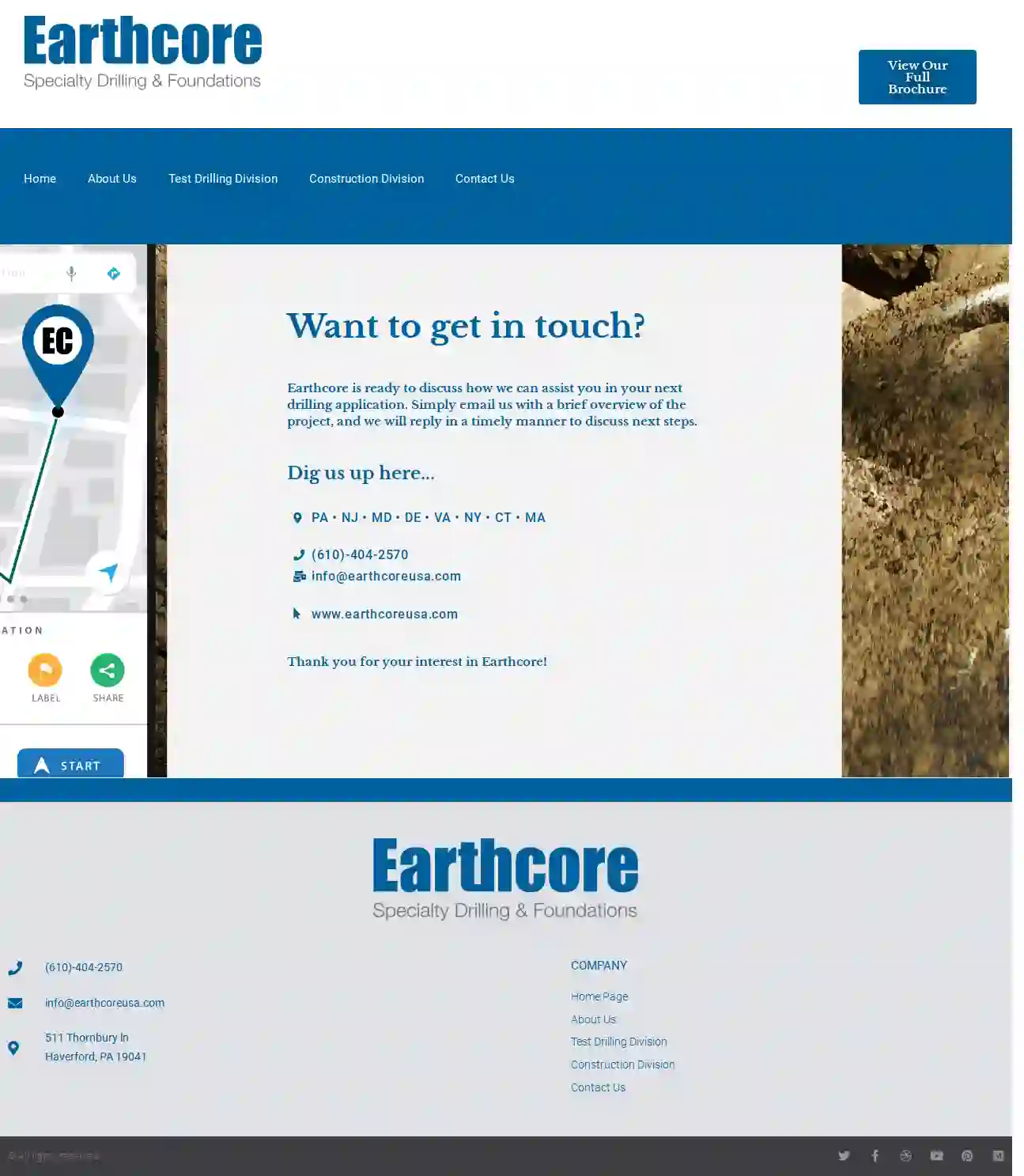
Earthcore
11 reviews455 Fairview Chapel Road, Birdsboro, 19508, USFor decades, engineers, contractors, and property owners alike have come to rely on Earthcore as the go-to resource to resolve their toughest drilling and foundation construction challenges. Headquartered in Birdsboro, PA, we deploy our crews across the Northeast and Mid-atlantic regions. With a proven track record of documented safety, certifications, and successful execution, Earthcore brings highly-experienced operators and a large, diverse fleet of powerful rigs to job-sites rapidly to get the job done right. We invite you to do a little digging of your own to learn how Earthcore may be the perfect solution for your project. Be it test borings, soil stabilization, or assistance with specialty foundation construction, we do it all.
- Services
- Why Us?
- Gallery
Get Quote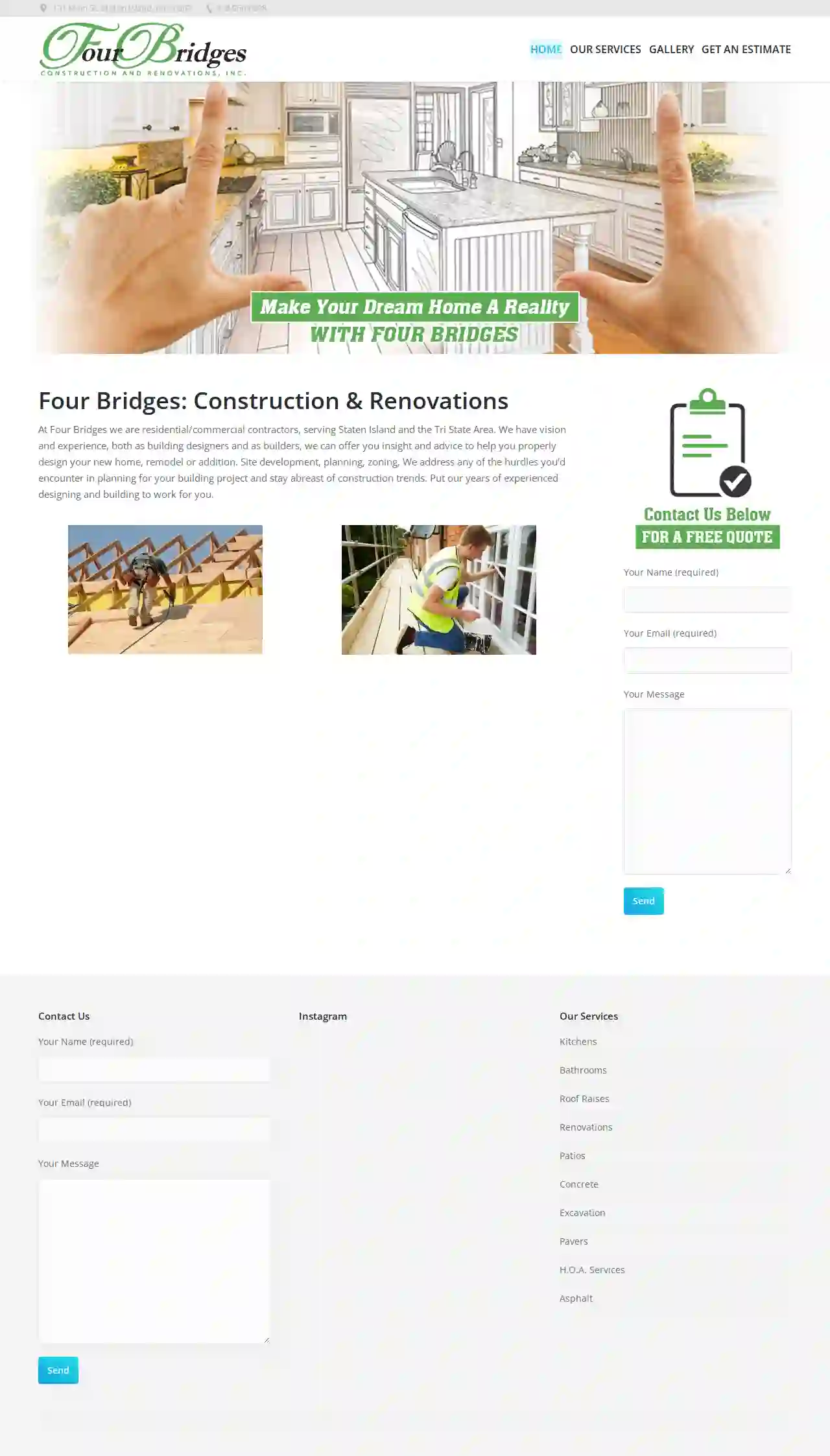
Four Bridges Construction & Renovations
131 Main St, Staten Island, 10307, USAbout Four Bridges Construction & Renovations At Four Bridges, we are residential and commercial contractors serving Staten Island and the Tri-State Area. We bring a unique blend of vision and experience, both as building designers and builders, allowing us to offer valuable insight and advice to help you design your dream home, remodel, or addition. We handle site development, planning, zoning, and navigate any hurdles you might encounter in your building project. We stay abreast of the latest construction trends to ensure your project is built with the highest quality and efficiency. Let our years of experienced designing and building work for you.
- Services
- Why Us?
- Gallery
Get Quote
Tribar Services Inc
54 reviews950 Route 36, Suite 101, Leonardo, 07737, USAbout Tribar Services Family owned and operated since 1995, we pride ourselves on maintaining deep ties to our community, while delivering a lasting and sustainable (literal) foundation for our clients. Based in Monmouth County and operating throughout the Mid-Atlantic, including Connecticut, we offer a wide range of services, performed by a staff of highly qualified and seasoned professionals. Such services include all aspects of Demolition, Foundation Repair & Construction, Full Service House Lifting, House Elevation, & House Raising, along with Concrete Masonry, Flatwork, & Hardscaping and including Rigging, Heavy Lifting, and Emergency Salvage related services. Our Core Values: We are a full service demolition company bringing the highest quality workmanship using the most cost effective means. Uniqueness: We tackle difficult projects with innovative solutions and creative strategies looking at each project with the philosophy of reduce, reuse and recycle. Service: Our staff of professionals are seasoned with diverse qualifications and backgrounds and the ability to give our clients the personal attention only a small company can provide. Including a full time NYC permit expediter. Integrity: A practice we apply to every project and expect from every employee to achieve the highest standards of professionalism and safety. We are fully licensed by the state of NJ, our license number is 13HE00003400. For information on your Demolition, House Raising, Boat Salvage & Recovery, Foundation Repair or Rigging project, contact the experts at Tribar Services, Inc. Contact us through our website by clicking here, or call us at 732-291-3464.
- Services
- Why Us?
- Our Team
- Testimonials
- Gallery
Get Quote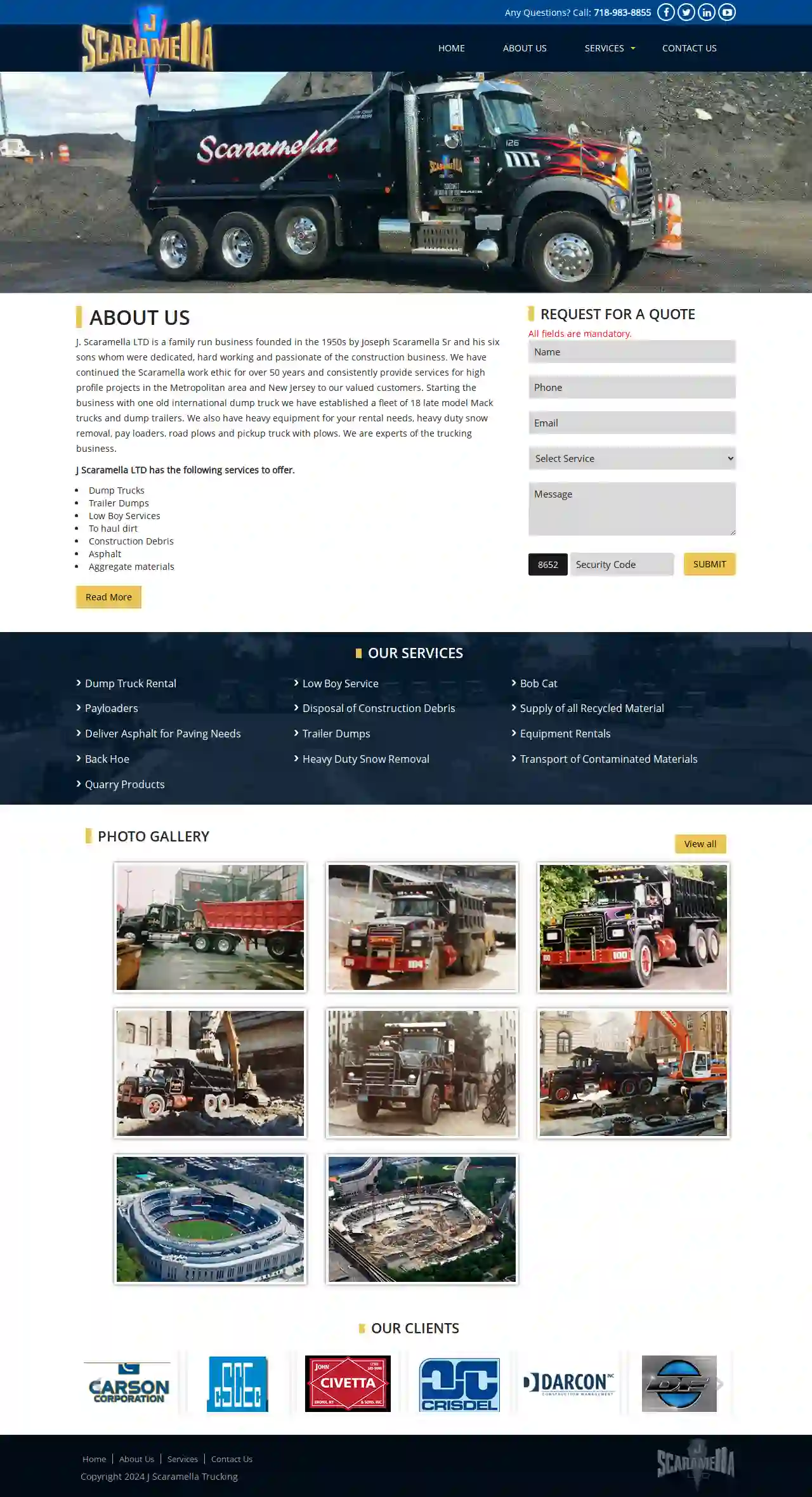
Scaramella Trucking
3.76 reviewsYork, USAbout Us J. Scaramella LTD is a family-run business founded in the 1950s by Joseph Scaramella Sr and his six sons, who were dedicated, hard-working, and passionate about the construction business. We have continued the Scaramella work ethic for over 50 years and consistently provide services for high-profile projects in the Metropolitan area and New Jersey to our valued customers. Starting the business with one old international dump truck, we have established a fleet of 18 late-model Mack trucks and dump trailers. We also have heavy equipment for your rental needs, heavy-duty snow removal, pay loaders, road plows, and pickup trucks with plows. We are experts in the trucking business.
- Services
- Why Us?
- Gallery
Get Quote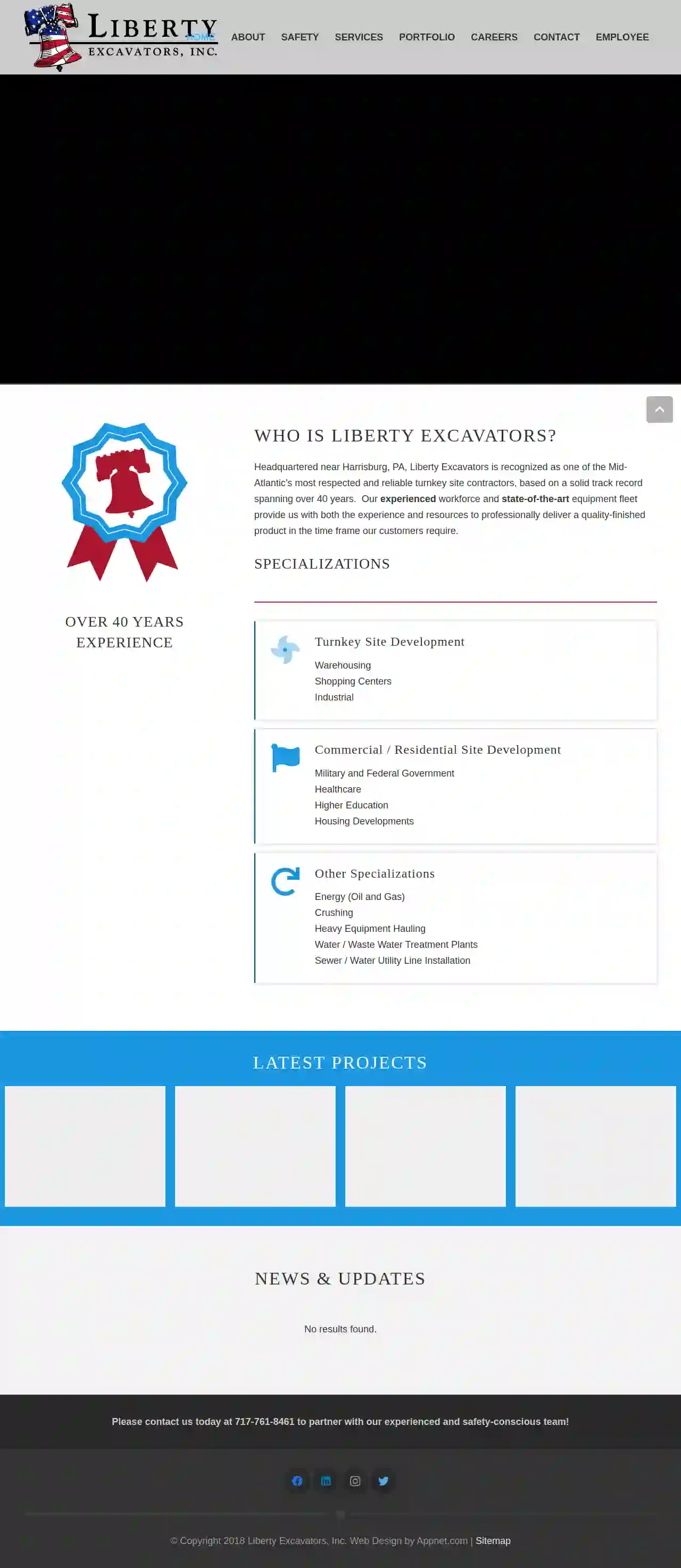
Liberty Excavators Inc
3.123 reviewsHarrisburg, USWho is Liberty Excavators? Headquartered near Harrisburg, PA, Liberty Excavators is recognized as one of the Mid-Atlantic’s most respected and reliable turnkey site contractors, based on a solid track record spanning over 40 years. Our experienced workforce and state-of-the-art equipment fleet provide us with both the experience and resources to professionally deliver a quality-finished product in the time frame our customers require. Specializations Liberty Excavators specializes in a wide range of projects, including: Turnkey Site Development Warehousing Shopping Centers Industrial Commercial / Residential Site Development Military and Federal Government Healthcare Higher Education Housing Developments Energy (Oil and Gas) Crushing Heavy Equipment Hauling Water / Waste Water Treatment Plants Sewer / Water Utility Line Installation
- Services
- Why Us?
- Gallery
Get Quote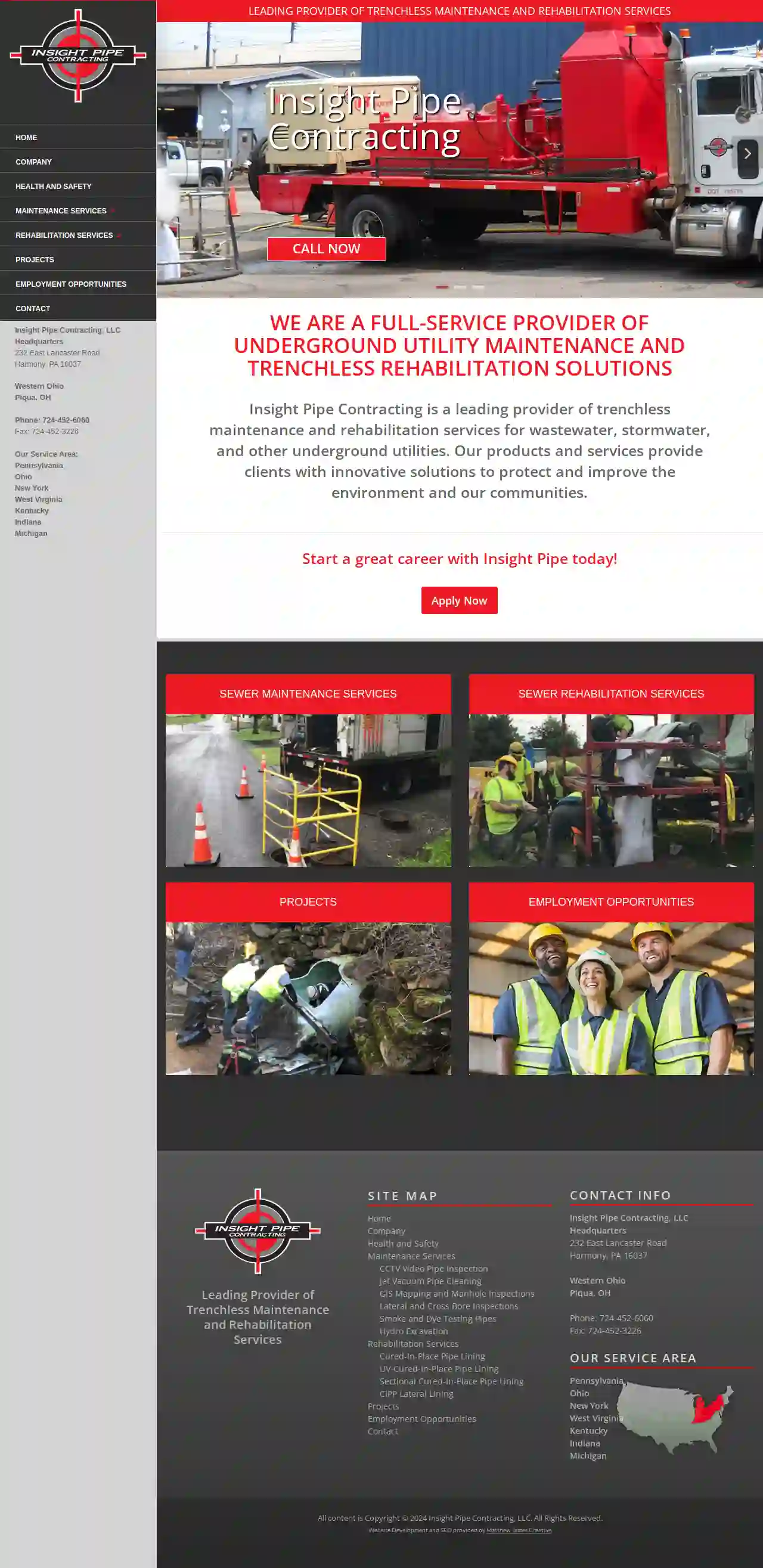
Insight Pipe Contracting, LLC
3.912 reviews232 East Lancaster Road, Harmony, 16037, USInsight Pipe Contracting, LLC Insight Pipe Contracting is a leading provider of trenchless maintenance and rehabilitation services for wastewater, stormwater, and other underground utilities. Our products and services provide clients with innovative solutions to protect and improve the environment and our communities.
- Services
- Why Us?
- Gallery
Get Quote
Superior Earth Works, LLC
51 reviewsBel Air, Maryland, USIntroducing Superior Earth Works, LLC Transforming project visions into reality is our specialty at Superior Earth Works. Based in Bel Air, MD, we dedicate ourselves to providing top-quality excavation and concrete services for residential and commercial clients. Our goal is to achieve excellence in every project. By understanding our clients' needs and delivering beyond their expectations, we ensure that each project stands as a testament to superior craftsmanship and dedication. We believe that quality workmanship is the cornerstone of our business, and we strive to maintain the highest standards in every project, along with timely delivery and reasonable prices. As an experienced excavation contractor, we specialize in site clearing, ensuring that your land is ready for any new construction. Our demolition services are efficient and thorough, making way for new possibilities. With our bobcat services, we handle everything from land grading to site preparation with precision and care. Our expertise includes shoring services, providing the necessary support to safeguard your construction projects. Whether you require land demolition, grading, regrading, or resloping services, we have the skills and equipment to execute the job to perfection. We deliver impeccable building site preparation and construction site preparation. In addition to our excavation capabilities, we offer a full suite of concrete services. From driveways to patios, we deliver concrete work that enhances the utility and visual appeal of your property. Our concrete services are designed to withstand the test of time, providing durable and attractive surfaces that you can rely on. Choosing Superior Earth Works means choosing an excavation partner who values your project and strives to achieve superior results. Experience the difference that our dedication to excellence can make -- contact us today to discuss your excavation needs. Superior Earth Works in Bel Air, MD, is here to provide you with the superior service you deserve.
- Services
- Why Us?
- Gallery
Get Quote
William Lawrence Excavating & Trucking
4.36 reviewsScranton, USAbout William Lawrence Excavating & Trucking William Lawrence Excavating and Trucking Company is a locally owned and operated business serving both residential and commercial clients in Montrose, PA for over 35 years. We take pride in our modern and well-maintained equipment, operated by a qualified, courteous, and reliable crew. Our commitment to safety is reflected in our fully insured operations. Whether you're planning a large or small project that requires excavating or trucking services, we offer free assistance in the planning stage and a free evaluation to help you find the most cost-effective methods available. We believe in delivering exceptional service and ensuring your project is completed to the highest standards. At William Lawrence Excavating & Trucking, we stand by our motto: "If We Start It…We Complete It!"
- Services
- Why Us?
- Gallery
Get Quote
CAG Construction Corporation
1540 Castleton Ave., Staten Island, USCAG CONSTRUCTION CORP. CONSTRUCTION DONE RIGHT Our experience ensures that your projects will be completed within budget, on time and with the upmost professionalism. LEARN MORE Family Run and Operated Construction Company Since 2007
- Services
- Why Us?
- Gallery
Get Quote
Over 22,076+ Excavation Companies registered
Our excavation experts operate in Northampton and surroundings!
ExcavationHQ has curated and vetted the Best Excavation Contractors in Northampton. Find a top & trustworthy pro today.
Frequently Asked Questions About Demolition Contractors
- Size and Type of Structure: The method should be suitable for the structure's size, height, and construction materials.
- Site Location and Accessibility: The method should be feasible given the site's location, surrounding buildings, and access constraints.
- Environmental Considerations: Prioritize methods that minimize environmental impact, such as deconstruction or selective demolition if feasible.
- Budget: Different demolition methods have varying costs, so choose one that fits your budget.
- Safety: Prioritize methods that ensure worker safety and minimize risks to surrounding areas.
- Waste Generation: Demolition generates a large volume of debris, contributing to landfill space and potentially releasing harmful substances into the environment if not disposed of properly.
- Air Pollution: Dust and particulate matter released during demolition can impact air quality, affecting human health and the environment.
- Noise Pollution: Demolition activities can generate significant noise, disturbing nearby residents and wildlife.
- Resource Depletion: Demolition consumes resources that could be salvaged and reused, contributing to resource depletion and environmental degradation.
- Site Security: Secure the demolition site with fencing and warning signs to prevent unauthorized access.
- Personal Protective Equipment (PPE): Workers should wear appropriate PPE, including hard hats, safety glasses, gloves, and steel-toe boots.
- Hazardous Material Removal: Properly identify and remove asbestos, lead paint, or other hazardous materials before demolition begins.
- Utility Disconnections: Disconnect all utilities, such as electricity, gas, and water, before demolition.
- Controlled Demolition Techniques: Employ controlled demolition methods to minimize risks and ensure the structure comes down safely.
- Dust Control: Implement dust suppression measures, such as water spraying or misting, to reduce airborne particles and protect air quality.
- Emergency Planning: Have an emergency plan in place, including communication protocols and evacuation procedures, in case of unforeseen events.
- Experience: Look for companies with a proven track record and years of experience in the demolition industry.
- Licensing and Insurance: Ensure the contractor is properly licensed to operate in your area and carries adequate insurance to protect you from liability.
- Safety Record: Inquire about their safety protocols and accident history. A reputable contractor prioritizes safety.
- References and Reviews: Ask for references from past clients and check online reviews to gauge their reputation and customer satisfaction.
- Professionalism: Choose a company that communicates clearly, provides detailed estimates, and has a courteous and responsive team.
How do I choose the right demolition method for my project?
What are the environmental impacts of demolition?
What are the safety precautions for demolition?
How do I find a reputable demolition contractor?
How do I choose the right demolition method for my project?
- Size and Type of Structure: The method should be suitable for the structure's size, height, and construction materials.
- Site Location and Accessibility: The method should be feasible given the site's location, surrounding buildings, and access constraints.
- Environmental Considerations: Prioritize methods that minimize environmental impact, such as deconstruction or selective demolition if feasible.
- Budget: Different demolition methods have varying costs, so choose one that fits your budget.
- Safety: Prioritize methods that ensure worker safety and minimize risks to surrounding areas.
What are the environmental impacts of demolition?
- Waste Generation: Demolition generates a large volume of debris, contributing to landfill space and potentially releasing harmful substances into the environment if not disposed of properly.
- Air Pollution: Dust and particulate matter released during demolition can impact air quality, affecting human health and the environment.
- Noise Pollution: Demolition activities can generate significant noise, disturbing nearby residents and wildlife.
- Resource Depletion: Demolition consumes resources that could be salvaged and reused, contributing to resource depletion and environmental degradation.
What are the safety precautions for demolition?
- Site Security: Secure the demolition site with fencing and warning signs to prevent unauthorized access.
- Personal Protective Equipment (PPE): Workers should wear appropriate PPE, including hard hats, safety glasses, gloves, and steel-toe boots.
- Hazardous Material Removal: Properly identify and remove asbestos, lead paint, or other hazardous materials before demolition begins.
- Utility Disconnections: Disconnect all utilities, such as electricity, gas, and water, before demolition.
- Controlled Demolition Techniques: Employ controlled demolition methods to minimize risks and ensure the structure comes down safely.
- Dust Control: Implement dust suppression measures, such as water spraying or misting, to reduce airborne particles and protect air quality.
- Emergency Planning: Have an emergency plan in place, including communication protocols and evacuation procedures, in case of unforeseen events.
How do I find a reputable demolition contractor?
- Experience: Look for companies with a proven track record and years of experience in the demolition industry.
- Licensing and Insurance: Ensure the contractor is properly licensed to operate in your area and carries adequate insurance to protect you from liability.
- Safety Record: Inquire about their safety protocols and accident history. A reputable contractor prioritizes safety.
- References and Reviews: Ask for references from past clients and check online reviews to gauge their reputation and customer satisfaction.
- Professionalism: Choose a company that communicates clearly, provides detailed estimates, and has a courteous and responsive team.